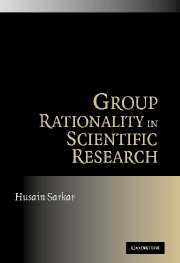Book contents
- Frontmatter
- Contents
- Preface
- Acknowledgments
- 1 The Overview
- 2 Group Rationality: A Unique Problem
- 3 The Problem Explored: Sen's Way
- 4 The Skeptical View
- 5 The Subjectivist View I
- 6 The Subjectivist View II
- 7 The Objectivist View
- 8 Putnam, Individual Rationality, and Peirce's Puzzle
- 9 The Nine Problems
- Bibliography
- Name Index
- Subject Index
1 - The Overview
Published online by Cambridge University Press: 18 July 2009
- Frontmatter
- Contents
- Preface
- Acknowledgments
- 1 The Overview
- 2 Group Rationality: A Unique Problem
- 3 The Problem Explored: Sen's Way
- 4 The Skeptical View
- 5 The Subjectivist View I
- 6 The Subjectivist View II
- 7 The Objectivist View
- 8 Putnam, Individual Rationality, and Peirce's Puzzle
- 9 The Nine Problems
- Bibliography
- Name Index
- Subject Index
Summary
Charles Robert Darwin (1809–1882) published Origin of Species on November 24, 1859; by the day's end, all the printed copies – all 1,500 of them – had sold out. The book was read avidly even by the laity – 500 copies went to Mudie's Circulating Library – and the revolution it initiated was off and running.
The cardinal tenet of Origin of Species was that there is evolution in the biological world that can be explained by the principle of natural selection. Darwin had argued that biological species evolve (were not separately created) through competition for scarce resources, and that the winner in said competition is defined by differential reproduction (one who is able to leave behind more offspring than others). Among the key Darwinian ideas, in part inspired by Thomas Robert Malthus's 1798 An Essay on the Principle of Population, was this: Nature is marked by ruthless, incessant competition for survival; to describe this idea, Darwin used phrases (that were to resonate long after) like “the universal struggle for life,” “the struggle for existence,” “battle within battle,” “the great battle of life,” “the war of nature,” and “the great and complex battle of life.” The organisms locked in this struggle are not merely competitors, but enemies. Crudely put, it is a zero-sum game gone haywire: Either you outlive your competition or you perish.
- Type
- Chapter
- Information
- Group Rationality in Scientific Research , pp. 1 - 23Publisher: Cambridge University PressPrint publication year: 2007

